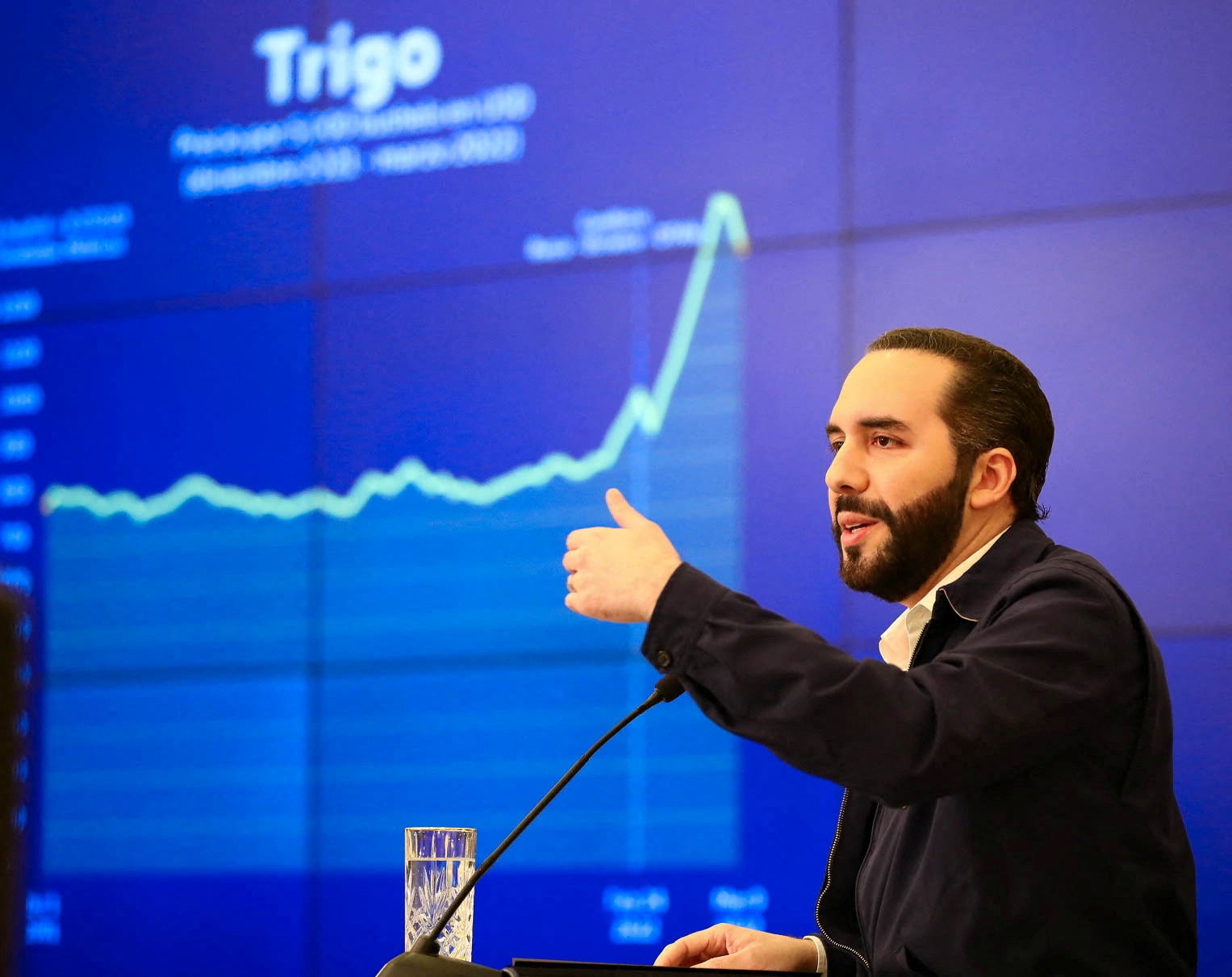El Salvador’s bitcoin-loving president is a human rights disaster
Human rights organisations inside and outside the country now face attacks if they question the approach of the Salvadoran government, and the impact of its policies on democracy


El Salvador has just suffered its deadliest day since the civil war ended 30 years ago. On Saturday 26 March, 62 people were murdered – a shocking number for a small Central American country with a population of just 6.5 million.
El Salvador is perhaps currently best known for having one of the youngest presidents. Elected in 2019 at the age of 37, president Nayib Bukele was the country’s first to not be elected for the right-wing ARENA or left-wing FMLN party (although he was previously mayor of San Salvador representing the FMLN, then after splitting with the party he ran for president as the candidate of the conservative GANA, before setting up his own Nuevas Ideas party).
He ran a campaign largely over social media, on a platform of replacing his corrupt predecessors, and declared victory in jeans and a leather jacket. His headline policy has been to introduce bitcoin as legal tender – an experiment that has probably been the least popular of his presidency so far.
The murders last weekend – and the gang violence that has plagued El Salvador for decades – ruin lives, businesses and shatter the future of thousands of Salvadorans. But despite its violent past and present, El Salvador is a beautiful country. It is where my husband was born, and where our children’s grandparents, aunts and uncles live and work.
The day after the spike in murders, congress approved a state of emergency declared by the government. For 30 days, constitutional guarantees of freedom of assembly are suspended, and arrests can be made without a warrant. Phone calls and messages can also be intercepted.
Using these powers, President Bukele has been sharing on Twitter that they had enabled the capture of over 5,000 gang members in around a week, adding: “And no, they will not go free.” He also announced that food rations for gang member inmates would be cut, as the government didn’t want to increase the budget for those recently arrested, and that gang members under the age of 18 will be tried as adults.
Any suspension of basic liberties is regrettable. And, while an increase in violence is of great concern to all, human rights organisations have questioned whether the state of emergency is relevant to a spike in homicides, particularly since President Bukele’s government had already used the Covid-19 pandemic to curb some freedoms.
Measures taken since the pandemic began have gradually reduced the ability to hold the government to account, from removing freedom of information, to not publishing the official financial accounts. “This is the most opaque government since the peace accords,” Omar Serrano, vice-rector of social outreach at the highly respected University of Central America (UCA), told me in El Salvador last month.
Human rights organisations inside and outside the country now face attacks if they question the approach of the Salvadoran government, and the impact of its policies on democracy. Bukele also targets his critics on social media, accusing one human rights group from the US this week of “only defending murderers”. On Twitter, he told the international community that if they were so concerned with the rights of gang members they could come and “help these little angels” themselves.
As Serrano said at the launch of UCA’s human rights report, just a day before the record number of murders were committed, “human rights and democracy are interdependent”; they are “two sides of the same coin”. He was referring to the report’s finding that human rights have deteriorated in El Salvador as institutional and legal frameworks have weakened.
Commenting on the spate of killings, UCA noted that the approach of the National Police Force is based more on repression than on investigation, intelligence and the anticipation of criminal action. It added that while there was evidence that negotiating with criminals had reduced homicides, it could also increase the criminals’ power, and called for an urgent change in policy.
This is perhaps a reference to the claim that Bukele’s Nuevas Ideas political party had bought the support of the gangs over the last couple of years – an accusation they have denied. The reason for the spike in killings remains unclear, although some analysts have suggested it was a way to send a message to the government. The number of homicides has fallen in the days since, with the President taking credit.
The government has certainly beefed up its PR work. In addition to an active social media profile, it is now publishing its own newspaper (sold cheaper than its competitors), and running its own TV channel. It is working: the President’s popularity continues to be high.
Brave journalists and human rights groups have been left to reveal the extent of ongoing violence and the real impact of the Covid-19 pandemic – something that without widely available testing or transparent reporting has been difficult to monitor accurately.
“[During the pandemic] we were the only radio station to cover the deaths of 90 elderly people in a care home,” Herminia Funes, director of YSUCA radio station, told me. It has also been revealing cases of forced disappearances and clandestine graves over the last few months. But this investigative work comes at a cost: journalists and staff at the station have received threats.
To keep up to speed with all the latest opinions and comment, sign up to our free weekly Voices Dispatches newsletter by clicking here
Visiting the country last month for the first time in three years due to Covid-19 travel restrictions, I was struck by the number of cars on the road. Traffic is even worse than it was before, particularly in the capital, San Salvador. One cause might be Covid-19 precautions, but it is also thought to be linked to the increase in gang violence, because rather than use public transport, which is often targeted by gang members, some people are now buying second-hand cars. Of course, there are large sections of the population who can’t afford a car, who have no alternative.
Though news of the violence may have aroused less attention (or been suppressed) over the last couple of years, it has continued throughout. There are still no-go areas of the country and the capital city, even for the police. An old friend of my husband told us that violence in his neighbourhood, and threats against the family, had become so bad that he was living in a different part of the country. His wife and daughter had fled abroad, and were seeking asylum in Belgium.
Economic hardship is another trigger for violence. I found prices had rocketed since my last visit, particularly for food, and still have no idea how the average Salvadoran has anything left in his or her pocket after buying groceries or filling the car with petrol.
The violence could also be linked to the lack of justice since the civil war claimed around 75,000 lives between 1980 and 1992. Not a single person has been brought to justice since the war ended, and 40 years on from the worst massacre in El Mozote, a village where almost 1,000 women, men and children were killed by Salvadoran armed forces.
Three decades after El Salvador’s civil war came to an end, the latest upsurge in killings, and the government’s reaction to it, show that peace remains distant for the Salvadoran people.
Wherever in the world it is happening, we should all be concerned when civil liberties and institutional independence are curbed, streets become increasingly militarised, and human rights organisations and journalists are directly attacked by the president of a democratic country.
With an already strong PR machine behind him, President Bukele continues to consolidate his power, meanwhile the ability to hold the government to account is slipping through the hands of the Salvadoran people.
Laura Ouseley is world news officer at CAFOD
Join our commenting forum
Join thought-provoking conversations, follow other Independent readers and see their replies
Comments
Bookmark popover
Removed from bookmarks